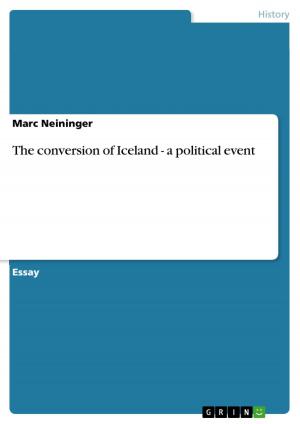| Author: | Pouyan Shekarloo | ISBN: | 9783640548989 |
| Publisher: | GRIN Publishing | Publication: | February 26, 2010 |
| Imprint: | GRIN Publishing | Language: | English |
| Author: | Pouyan Shekarloo |
| ISBN: | 9783640548989 |
| Publisher: | GRIN Publishing |
| Publication: | February 26, 2010 |
| Imprint: | GRIN Publishing |
| Language: | English |
Seminar paper from the year 2009 in the subject History - Asia, grade: B+ (2), The American Central University (Department of History), course: Russian Revolutions, language: English, abstract: In the summer of 1927, the government and the Communist Party of the Soviet Union fell victim to an acute war panic, which became known as 'the War Scare'. Many high-ranking Soviet politicians expressed their fear that war was likely to break out at any moment. The political leadership worried about a concerted effort by a united imperialist world to invade and destroy the young and fragile Soviet state. Frantic steps were taken to alarm and mobilize the party, the Soviet people, and the constituent parties of the Communist International (Comintern) to defend the 'socialist fatherland.' A massive propaganda machinery was conducted with urgent appeals to the Soviet population, to the proletarians of other countries, and to the colonized people of Asia, to prepare for 'war against war.' In the historiography of the early Soviet Union, the War Scare is still a disputed topic among scholars. Many argue that Soviet politicians manipulated the danger of war in the course of a factional struggle in the ruling Communist party for their own advantage. Although it was Stalin, who ultimately exploited the War Scare more effectively and derived the greatest benefit from it, he was not the only one. It was Bukharin, the head of the Executive Committee of the Communist International (Comintern), who initiated it. Moreover, the Opposition consisting of Trotsky, Zinoviev and Kamenev, tried to use the opportunity to carry out an assault on Stalin's foreign policy and to criticize the degeneracy of the party regime under his control. This attempt backfired, and the Opposition saw itself suddenly confronted with charges of disloyalty in the face of an external threat. A few months later, Trotsky and Zinoviev were expelled from the party and the reign of Stalin began. For the historians, it is hard to say what the protagonists really thought or believed during the War Scare. However, they know that the Soviet leaders often used times of crisis in international politics to mobilize and rally the nation behind them, thereby suppressing and silencing the Opposition further. On the other hand, the interwar era is also known as 'the twenty years crisis' with many ruptures in international relations. The First World War and the foreign intervention of Western countries during the Russian civil war are not forgotten either.
Seminar paper from the year 2009 in the subject History - Asia, grade: B+ (2), The American Central University (Department of History), course: Russian Revolutions, language: English, abstract: In the summer of 1927, the government and the Communist Party of the Soviet Union fell victim to an acute war panic, which became known as 'the War Scare'. Many high-ranking Soviet politicians expressed their fear that war was likely to break out at any moment. The political leadership worried about a concerted effort by a united imperialist world to invade and destroy the young and fragile Soviet state. Frantic steps were taken to alarm and mobilize the party, the Soviet people, and the constituent parties of the Communist International (Comintern) to defend the 'socialist fatherland.' A massive propaganda machinery was conducted with urgent appeals to the Soviet population, to the proletarians of other countries, and to the colonized people of Asia, to prepare for 'war against war.' In the historiography of the early Soviet Union, the War Scare is still a disputed topic among scholars. Many argue that Soviet politicians manipulated the danger of war in the course of a factional struggle in the ruling Communist party for their own advantage. Although it was Stalin, who ultimately exploited the War Scare more effectively and derived the greatest benefit from it, he was not the only one. It was Bukharin, the head of the Executive Committee of the Communist International (Comintern), who initiated it. Moreover, the Opposition consisting of Trotsky, Zinoviev and Kamenev, tried to use the opportunity to carry out an assault on Stalin's foreign policy and to criticize the degeneracy of the party regime under his control. This attempt backfired, and the Opposition saw itself suddenly confronted with charges of disloyalty in the face of an external threat. A few months later, Trotsky and Zinoviev were expelled from the party and the reign of Stalin began. For the historians, it is hard to say what the protagonists really thought or believed during the War Scare. However, they know that the Soviet leaders often used times of crisis in international politics to mobilize and rally the nation behind them, thereby suppressing and silencing the Opposition further. On the other hand, the interwar era is also known as 'the twenty years crisis' with many ruptures in international relations. The First World War and the foreign intervention of Western countries during the Russian civil war are not forgotten either.















